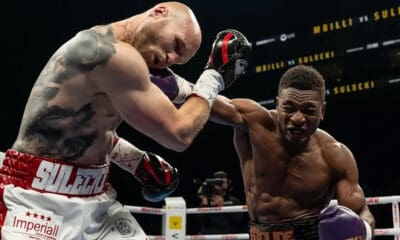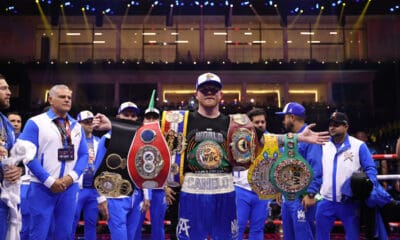Everyone was so sure middleweight monster Gennady Golovkin would go through Canelo Alvarez like a hot knife through butter. Alvarez didn’t stand a chance. He had too many defensive liabilities. His arms were too short. His feet were too slow. He didn’t hit hard enough.
There were so many reasons, at least in the minds of the contentious boxing circles that groupthink their ways into forming Internet mobs in order to rob boxing judges of their livelihoods, that almost none of them considered this one thing.
Alvarez may have actually won the fight.
It was that close. Alvarez fought well enough in the first three and last two rounds to grab all five of them, and could have won at least two of the other seven. Every single round was close and competitive. Those who favor things like aggression and punch volume think Golovkin won. Those who prefer ring generalship and clean punching like Alvarez.
The fight being scored a draw makes perfect sense. Regardless of scores, the fact that one judge liked Golovkin, one liked Alvarez and the other saw a draw makes perfect sense for a fight like this one. From that perspective, the judges probably got this fight as right as it could get.
Shouldn’t that be what matters?
Why is it that every close fight devolves into so much anger and indignation? If anyone should be angry, it’s the two fighters who probably could have left a little more in the ring that night.
Alvarez came out of the gate fast, but slowed in the middle rounds. Finishing strong is great, but not at the expense of the entire middle of the fight. And wasn’t Golovkin supposed to be the most unstoppable middleweight fighter ever? What stopped him from making the bout a widely scored unanimous decision win? Where was his ferocious knockout punches? Why couldn’t he land anything clean with any real regularity?
The fighters were evenly matched. Both have had tremendous careers to date, and both fought at a fevered pitch. It was an entertaining, artful exhibition of the sweet science. The bout was one of the better middleweight championship bouts ever, and yet here we all are debating the one lopsided score judge Adelaide Byrd turned in for Alvarez.
Here’s something to consider as you gather your friends for your local boxing mob: boxing’s 10-point must system is the reason we get scores that don’t always reflect the actual fight. Judges are encouraged to score 10-9 rounds in almost every round unless there is a knockdown or some type of point deduction. Almost every round of Canelo-GGG was highly competitive. From where Byrd was sitting at ringside, it’s entirely conceivable she saw 12 close rounds that were hard to score. If she saw Alvarez edge out 10 of them, who are we to say she is wrong?
Without scoring too-close-to-call rounds even instead of 10-9, Byrd’s card was doomed to appear lopsided. Let’s say all 12 rounds were close. Had she seen Golovkin edge out each round the score would have been 120-108. Under the current scoring system, that still wouldn’t be wrong. That’s just the way she saw the rounds where each round is supposed to be judged separate from all other rounds. Would we prefer she randomly assign close rounds alternately to each fighter? Is that somewhere in a judge’s rulebook?
Were you sitting in her seat? Have you ever experienced the difference that sitting ringside provides? Was it her who had television commentary teams in her ear all night telling her what her eyes should have been able to see themselves?
It’s okay if you think Golovkin deserved the nod. Many people feel the same way you do. It’s also okay if you think Alvarez won the fight. There are people that think the way you do, too.
And a draw? Well, that seems about perfect for this type of fight.
But calling for investigations? Calling the bout a farce? Making up in your head that that Byrd is either inept or disingenuous or both?
That’s the real farce.






















